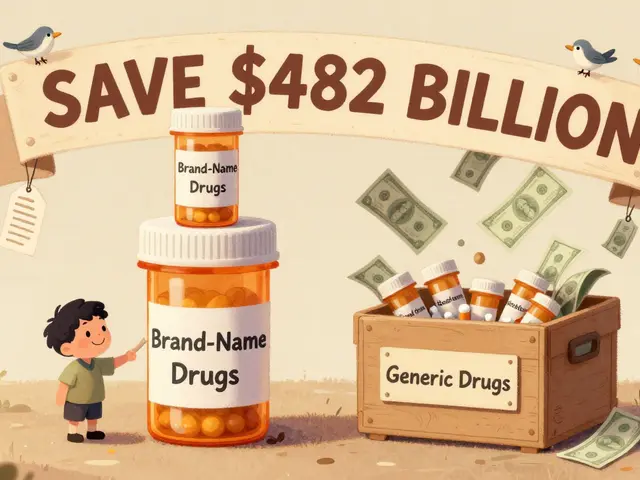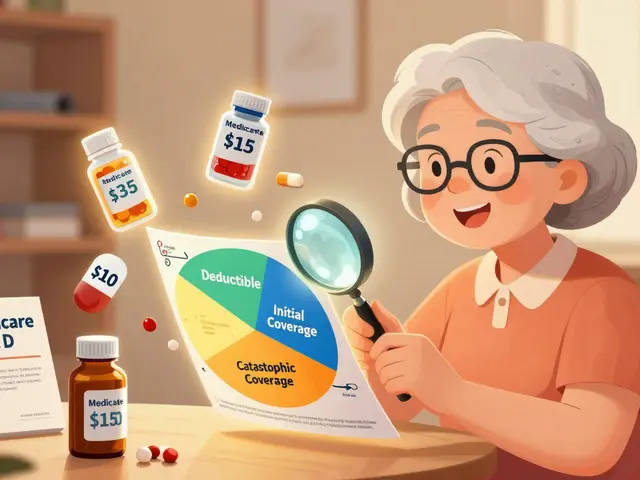
Picture this: One small pill, the kind you'd never glance at twice if you dropped it on the kitchen counter, has the power to pull someone out of a mental health crisis. That humble tablet is Abilify, or as it’s known to pharmacists, aripiprazole. It’s a game-changer for some and a lifeline for many folks battling everything from schizophrenia and bipolar disorder to depression that won’t budge with antidepressants alone. But what’s behind the hype? Is it as effective as some say, and are the side effects worth it? People want real talk—not just what’s scrawled on the pharmacy handout. Here’s the scoop.
How Does Abilify Work, and Who Actually Needs It?
Abilify isn’t your average antipsychotic. It belongs to a group called atypical antipsychotics, and it came onto the scene in 2002 approved for adults with schizophrenia. Soon after, bipolar disorder was added to its target list, along with major depressive disorder (as an add-on, not a solo act). Some doctors even prescribe it off-label for anxiety, irritability in autism, or impulse control. But how does it actually work? Most antipsychotics simply block brain dopamine, which can help quiet hallucinations or delusions but often leaves people feeling flat or too sluggish. Abilify does something different—it acts more like a volume dial than a simple on/off switch for dopamine, nudging it up where it’s too low and dialing it down where it’s too high. That means it tends to cause less sedation and less weight gain than older options like olanzapine or quetiapine.
The catch? Everyone’s brain responds differently. If you look at clinical trial data, about 1 in 3 patients with schizophrenia report significant symptom improvement after 6 weeks, which means not everyone hits the jackpot. Still, for those who do, daily life can start looking a whole lot brighter: fewer voices, less paranoia, or more consistent moods. Kids as young as 6 with irritability from autism can be prescribed a lower-dose Abilify, according to FDA guidelines. But for anyone (especially kids or teens), it’s only used when other options haven’t done the trick or side effects weren’t tolerable.
Doctors tend to start low and go slow. For adults, 10 to 15 mg is a common starting dose for schizophrenia, while depression add-on usually begins at 2 to 5 mg. It’s not a ‘one and done’ pill either—it can take several weeks to see real changes. If you’re hoping for that overnight miracle, you might want to temper your expectations. But if everything else has failed, Abilify sometimes does the trick where others don’t. There’s one more twist: Abilify comes as a pill, a dissolvable tablet, and even a once-a-month injection (for those who are tired of checking pillboxes or just forgetful). That long-acting shot has made a real difference for people who struggle with taking pills daily.

What’s the Evidence: Real Effectiveness, Real Side Effects
Maybe you’ve heard Abilify is safer than its ‘cousins.’ There’s truth to that, but ‘safer’ doesn’t mean ‘risk-free.’ The biggest perks? People are less likely to gain a ton of weight—though it still happens. According to a 2020 study published in JAMA Psychiatry, out of 2,258 patients taking Abilify for psychosis, only 12% gained more than 7% of their starting body weight after 6 months. That’s better than nearly double the rate on quetiapine or olanzapine, but not zero. Diabetes risk? Still there, but lower compared to the other big-name antipsychotics. Some people do see a boost in cholesterol or blood sugar, so regular check-ups are smart.
So what should you expect if you or someone you care about starts taking it? Here’s the honesty you won’t always get from your doctor:
- Restlessness or jumpiness—called akathisia—can show up, especially in those first weeks. You might feel like you can't sit still or relax.
- Insomnia is a twist—unlike many meds that cause sleepiness, Abilify might hype you up.
- Movement issues, such as tremor or stiffness, are less common than with older antipsychotics, but not impossible.
- Rarely, it can cause compulsive behaviors—some people develop gambling troubles, binge eating, or spend money impulsively. If that happens, it’s vital to call your prescriber pronto.
- Other common side effects: headache, nausea, constipation, mild anxiety, and some hormonal changes (including increased prolactin in a minority of patients).
Ever heard about tardive dyskinesia? That’s a potentially permanent movement disorder caused by some long-term antipsychotic use, and Abilify’s risk is much lower than most, but again, not zero—especially with high doses or long use. Here’s something wild: a report from the Mayo Clinic showed the yearly risk for tardive dyskinesia on Abilify was under 1%, compared to 5% on older drugs. No one loves those odds, but it’s better than the past.
There are a few red flag warnings, too. Abilify comes with a black box warning (literally a thick black border on the packaging) about increased risk of stroke and death when used in older adults with dementia-associated psychosis. Sadly, it’s not the only antipsychotic with that risk—but it means doctors should never give it lightly in that population. On the flip side, the suicide risk in mood disorders sometimes drops as symptoms improve, but agitation can spike at the start, so folks need close monitoring in the first few weeks. It’s a delicate balancing act.
| Side Effect | How Common (%) | Compared to Placebo |
|---|---|---|
| Akathisia (restlessness) | 10-16% | 2x higher |
| Weight Gain >7% Body Weight | 12% | Similar to placebo, lower than other antipsychotics |
| Somnolence (sleepiness) | 8-11% | Lower than other antipsychotics |
| Tremor/Stiffness | 5-10% | Similar to placebo |
| Compulsive Behaviors | <1% | Rare, but higher than placebo |
Let’s talk drug interactions—boring, but crucial. Abilify’s got a long half-life (that’s how long it stays active in your body), so if you mix it with things like strong antifungals, some seizure meds, or even St. John’s Wort, blood levels can rise or fall. Stick to whatever your doctor prescribed and mention even herbal supplements. Grapefruit juice isn’t a problem here (unlike with some others). Alcohol can make drowsiness and poor coordination worse, so most docs suggest cutting back or skipping drinks. As for stopping Abilify, don’t go cold turkey—withdrawal symptoms are real, and a slow, doctor-guided taper works best.

Tips, Real-World Experiences & What You Won’t Read on the Label
What do actual people say about Abilify? Scroll through message boards or Reddit, and you’ll find every opinion—from “this gave me my life back” to “never again—couldn’t sleep and felt jittery all week.” There’s no magic script, so it’s helpful to know what seems to work best for most folks. Here’s what’s been picked up from both medical pros and people who’ve been there:
- Start with food if it bothers your stomach. Many users swear by this to avoid nausea when first starting out.
- If insomnia or restlessness hits, trying the dose in the morning, not before bed, helps a surprising number of people.
- The once-a-month injection is a big win for those afraid they’ll forget pills or don’t want family constantly checking if they took their meds.
- Tracking your weight, sleep, and mood daily (good old notebook or smartphone app) helps catch side effects quickly and gives your doctor evidence to tweak your dose.
- If compulsive behaviors happen—even mild ones like wanting to gamble or shop—flag it early. Sometimes a small dose change fixes it.
- Plan regular check-ups: blood tests for cholesterol and blood sugar every 6-12 months, and an annual check on movement symptoms. Even if you feel fine, these catch things before they become an issue.
- If you’re pregnant, it’s a tricky call—some experts say Abilify may be one of the ‘safer’ antipsychotics during pregnancy, but only if the mental health risks without medication outweigh the unknowns. Definitely a decision for you and your team, not the internet.
If you’re supporting someone who takes Abilify, patience helps more than you’d think. New meds mean changes in sleep, mood, and appetite—sometimes for the good, sometimes not. Resist the urge to comment on every quirk, and instead, ask how they’re feeling day to day. Don’t expect a smile overnight, but small wins matter.
There’s a rumor that once you start Abilify, you’re on it for life. That’s just not true. Plenty of people, especially those with milder symptoms or a single big episode like post-partum psychosis, taper off after a year or two under their doctor’s guidance. On the flip side, for chronic conditions, staying on a low, steady dose can prevent hospitalizations and keep stable relationships or work going. Long-term safety is taken seriously—many patients have safely used it for 10+ years. Yet, if a side effect starts to creep in, it’s completely reasonable to ask if another medication—or no medication—is right for you at that moment.
Insurance? The generic version—aripiprazole—usually costs much less, and most US plans cover it without much trouble. Copay cards and pharmacy discount programs bring prices down for almost everyone, but check local options.
In the end, Abilify doesn’t fix life’s problems, but sometimes it turns living from impossible to manageable. Its reputation isn’t just hype—there’s good evidence it can be a lifeline, especially for tough-to-treat mental conditions. Problems like restlessness or lack of sleep can make you rethink things, but many users find a way to live with these or swap for a different med if needed. The biggest advice? Track changes closely, ask questions often, and remember—if you’re struggling, you’re not alone. Real talk, real support, and a willingness to try new solutions can make all the difference.





Vishwajeet Gade
May 30, 2025 AT 02:43Abilify? Bro, I took it for 3 months and felt like a zombie with a caffeine addiction. No sleep, constant leg jiggling, and my bank account cried. Worst decision since I tried to cook curry with a microwave.
Casey Crowell
May 31, 2025 AT 07:39Man, I get what you mean 😔 but for me, Abilify was the first thing that actually quieted the noise in my head. I went from crying in the shower every day to laughing at dumb TikToks again. It’s not perfect-yeah, I got akathisia-but I’d take restless legs over suicidal thoughts any day. 🙏
Shanna Talley
May 31, 2025 AT 13:43Just want to say thank you for writing this. So many people treat meds like magic bullets or evil pills but it’s so much more nuanced. I’ve been on aripiprazole for 8 years and yes, I had side effects-but I also got to hold my kid without feeling like I was drowning. You’re helping people feel less alone. 💛
Samuel Wood
June 1, 2025 AT 21:33Actually, the pharmacokinetics of aripiprazole are far more complex than this article suggests. The D2 partial agonism is often misunderstood-most laypeople don’t realize it’s not just a dopamine modulator but also a 5-HT1A agonist. The clinical trials are statistically underpowered for long-term outcomes. Also, typo: it’s ‘affect’ not ‘effect’ in the second paragraph. 🤓
ridar aeen
June 2, 2025 AT 08:12I get why people love Abilify, but let’s not pretend it’s a wellness trend. My cousin went from stable to compulsive gambling in 6 weeks. No one warned her. That black box warning? It’s there for a reason. And yeah, I’m mad they market it like it’s a vitamin.
chantall meyer
June 3, 2025 AT 17:00If you need a pill to feel human, maybe you’re not trying hard enough. Meditation, sunlight, and accountability partners work better than chemicals. I’ve seen it. Your brain isn’t broken-it’s just lazy.
Will RD
June 4, 2025 AT 00:03Abilify made me horny and broke. I spent $3k on online poker and then couldn’t sleep. Doc said ‘it’s rare’ but it happened. Don’t trust the stats. Trust your gut. And stop taking it at night. Morning only.
Jacqueline Anwar
June 5, 2025 AT 14:56It is profoundly irresponsible to present this medication as a panacea without emphasizing the ethical implications of off-label prescribing in adolescents. The FDA’s approval for irritability in autism does not equate to therapeutic endorsement for behavioral control. This article borders on pharmaceutical propaganda.
Ganesh Kamble
June 7, 2025 AT 01:41lol this article is just a pharma ad with extra steps. Everyone knows Abilify is just a fancy placebo with extra side effects. My cousin’s dog had better mental health after being on it than she did.
Jenni Waugh
June 8, 2025 AT 12:03Let me tell you something-this isn’t just about dopamine. It’s about dignity. I was homeless. I was in and out of ERs. Abilify didn’t ‘fix’ me-but it gave me the space to fix myself. So yeah, I got restless. So what? I got a job. I got a cat. I got a life. Don’t let the haters make you forget: meds aren’t the enemy. Shame is.
Theresa Ordonda
June 10, 2025 AT 10:11So I started Abilify and immediately started buying $500 shoes. Then I realized I had 12 identical black jackets. My therapist said ‘it’s the medication.’ I cried. Then I tapered. Now I’m off it. No regrets. But if you’re gonna take it-track EVERYTHING. Even your grocery list.
Judy Schumacher
June 10, 2025 AT 13:05While the pharmacological profile of aripiprazole demonstrates a nuanced interaction with dopaminergic and serotonergic systems, the clinical literature remains marred by publication bias and industry-sponsored trials. Furthermore, the assertion that weight gain is ‘lower than other antipsychotics’ is statistically misleading when contextualized against baseline BMI, metabolic syndrome prevalence, and duration of exposure. The author’s tone is dangerously reductive. This is not ‘real talk’-it’s sanitized marketing.
Megan Raines
June 10, 2025 AT 21:07Wait… so if I take this and start compulsively buying vintage vinyl, that’s a side effect? Not a personality upgrade? Just asking.